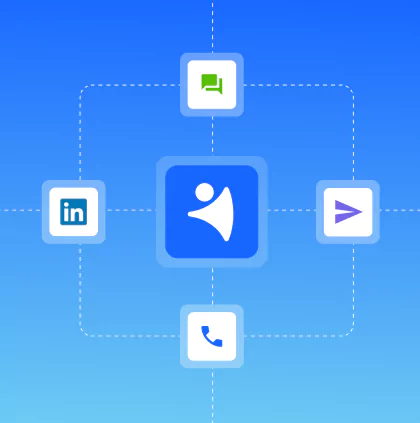If the B2C sales process is a sprint, B2B is a marathon.
Companies catering to other businesses’ needs don’t have the luxury of quick sales. Instead, you must build relationships and nurture leads for weeks, if not months, to close the deals. Even if you don’t have millions of potential customers, keeping track of all contacts and company details in spreadsheets is a chore.
A B2B customer relationship management tool like NetHunt CRM specifically addresses your B2B needs. It’s a solution for managing contacts and deals, automating menial tasks, monitoring team performance, and growing your business by winning more deals. Let us show you how you can benefit from using a B2B CRM like NetHunt.
B2B CRM features that you’re missing out on
Why do you need B2B CRM software when you already have your Google Workspace and spreadsheets? Here’s how a simple CRM solution is better compared to the tools you’re already using:
- Contact and account management. Instead of relying on piecemeal data, a CRM lets you add as many standard and custom fields as you need to every contact and company. This way, you get a 360-degree view of every lead. Just think about how you can put this info to good use to tailor your lead nurturing efforts.
- Sales pipeline tracking tailored for B2B. You can’t keep track of every potentially lucrative lead in Google Sheets. Something will always fall through the cracks, considering how complex B2B pipelines get. With B2B CRM tools, you can track all critical leads with a single glance at a custom pipeline dashboard.
- Advanced lead nurturing and segmentation. Drafting personalized emails for every lead isn’t sustainable. But with a CRM, you can divide your contacts into segments (by location, demographics, etc.) and target them for custom nurturing campaigns. It’s a win-win: your team saves time, and your conversion rates skyrocket.
- Multi-channel communication. It’s easy to lose track of conversations with leads when they jump from social media or email. Instead of switching between tabs and searching for relevant threads, you can use a B2B CRM system to centralize your conversations across all platforms and boost customer satisfaction for better conversions.
- Integrations with other tools in your business ecosystem. Handling a dozen different apps and tools puts extra strain on your sales team and reduces their productivity. So it’s a good thing a B2B CRM integrates with countless other tools you already use, from daily staples like Google Workspace to niche solutions across various verticals.
And these are just scratching the surface of what B2B CRM solutions can do for your business.
How will your business benefit from using a CRM in B2B marketing?
If you’re still unconvinced you need a CRM for B2B, let’s see how these features translate into measurable benefits for your business. Here are just a few examples of what you expect once you implement business-to-business CRM:
- Improved B2B client satisfaction rates. Detailed contact profiles and omnichannel communication boost sales. Everyone wants personalized offers, especially B2B decision makers, and the ability to pick up right where they left off, regardless of their chosen communication channel or the sales manager they talk to. Happy leads convert faster and more readily.
- Enhanced sales pipeline visibility. When you can see every lead at a glance, it’s easy to adjust your sales strategy and address pitfalls and bottlenecks. When you offer timely personalized offers and additional boosts to leads, they are more likely to become paying customers.
- Better sales and marketing team collaboration. When every team member gets instant access to contact details and communication logs, it’s easier to develop a cohesive strategy and routine. Besides, visibility saves you time on meetings.
- Data-driven decision-making. With a CRM for B2B business, you don’t have to rely on guesswork. You’ll know for sure which leads and managers bring in the profits and why deals fall through. All these insights become available thanks to all the data a CRM collects and uses in automated reporting.
All it takes to reap all these benefits of customer relationship management in B2B marketing is to choose the right CRM. And NetHunt CRM is the best CRM for B2B sales.
What makes NetHunt CRM the best CRM software for B2B?
The best B2B CRM aligns with your business goals. Let us demonstrate what NetHunt CRM can do for you.
Generate and nurture more leads
NetHunt is an all-in-one leads generation CRM system. It will help you capture leads on your website, social media, messengers, and other channels.
NetHunt will instantly capture and enrich contact records, which you can then analyze and segment for targeted campaigns.
Thanks to view filters, you can divide your databases using demographics, location, score, or engagement with your emails or other marketing tools. With this data, you can develop customized nurturing campaigns to guide leads along your sales pipeline and into converting.
Organize and maximize contacts and deals details
Managing lead and deal details is a core B2B CRM solution. What sets NetHunt apart is its sheer flexibility in data storage and organization. For one, importing data from Google Sheets is easy and fast. The CSV import process will guide you through all the necessary steps.
Besides, you can create and customize folders for individual business processes. It’s up to you to choose required and additional fields for contacts, companies, tech support cases, and more.
Deliver optimized communication experience
Forget switching between tabs and sorting through endless chats and email threads. NetHunt CRM comes with Facebook, Instagram, and WhatsApp integration. You can also connect it to Viber, and Telegram.
Once all the communication channels run through your CRM, you’ll have a full view of every interaction with leads.
These logs are invaluable for customizing sales approaches and understanding leads’ decision-making.
Let’s not forget that customers hate repeating themselves. They want you to pick up the conversations where they left off, regardless of the channel. NetHunt CRM helps you achieve this unattainable gold standard and makes leads more likely to convert.
Leverage your Google Workspace for winning deals
If you’re used to running your business through the inbox, NetHunt CRM is the top choice.
As a CRM with Google Workspace integration, it allows you to see the full-scale CRM control panel right in your Gmail inbox. From there, you can access all relevant records, control the pipelines, and develop automated workflows.
Enriching the familiar interface with additional CRM functionality will also make it easier for your team as it will instantly minimize the friction of new software adoption.
Customize multiple pipelines for B2B sales cycles
You’ll see extra evidence of NetHunt CRM flexibility when setting up your first pipeline. Aside from default stages, you can add as many additional steps as you need along the way to suit your B2B sales cycle.
Moreover, NetHunt supports multiple pipeline management in CRM. You can set up a marketing pipeline to focus on qualifying and scoring leads. A post-sales pipeline is also invaluable for B2B if you want to build lasting relationships and boost customer lifetime value.
No matter how many pipelines you set up in NetHunt CRM, you’ll get full visibility and transparency to control the sales team's performance.
Gain valuable sales insights from custom reports
Your B2B sales process is as good as the decisions you make. And NetHunt reports are the ultimate insight-generation tools. For every pipeline you create, you can generate custom reports to guide your B2B CRM strategy. Choose the focus for each report to sort won and lost deals by sales representatives, explore the reasons behind lost deals, and study the deal sources to boost your lead generation efforts.
But NetHunt CRM reports aren’t just about the past. They are your forecasting and planning tools. Thanks to comparison tools, you can see just how good (or bad) your latest quarter is and estimate future profits. Adding these considerations to your strategic planning will surely help your business grow.
Maximize business benefits with B2B CRM best practices
Even the best B2B CRM software can fail if you don’t use it right. Here are a few things to consider when adopting a new CRM.
Understand your target audience
CRM is not a magic sales solution. It won’t sell your products or services by itself. You need to understand your customers' needs and pain points, then show how your solutions are better than those of your competitors.
Although CRM does store customer records and generates insights, you’ll need a good grasp of your target audience to score and segment it for targeted campaigns.
This knowledge is also invaluable for setting up automated workflows. For example, while some leads are ready to convert after reading a single email, others may need calls and demos before you close the deal.
Align your CRM with marketing and sales goals
While 'customization' might seem like just another buzzword, it’s a critical feature in advanced CRMs for good reason. Tools like NetHunt CRM allow you to tailor lead records by selecting the fields you want to see and customizing the dashboard layout to suit your needs.
Customizable sales pipelines are particularly important — they should mirror your unique sales cycles to be truly effective. By adding all relevant stages and setting up automations to guide leads through the funnel, you can unlock the full potential of any B2B CRM.
Train your team to maximize CRM benefits
No one likes change. Employees will always try to do things the old and familiar way instead of using the shiny new CRM. And they’ll inevitably lose leads and deals in the process. That’s why you must explain and emphasize the benefits of using a B2B CRM and set up training for everyone to get comfortable using the new tools.
Luckily, your team won’t need technical skills to master NetHunt CRM. And they can always find useful tips and answers to their questions in our knowledge base.
Conclusion
You can’t overestimate the importance of CRM in B2B markets. Even if you don’t deal with customers by the million, CRM helps set up and track complex and drawn-out B2B sales cycles. Enriched contact and company records, advanced lead capture and nurturing tools, pipeline visualization, and automated reporting all make CRMs invaluable for B2B markets. And NetHunt CRM is the best CRM for B2B, a flexible solution for business growth.





















 product experts — let's find the best setup for your team
product experts — let's find the best setup for your team